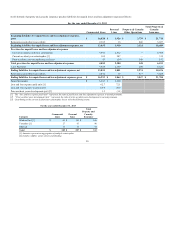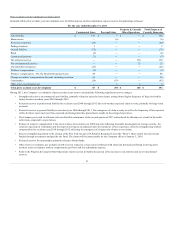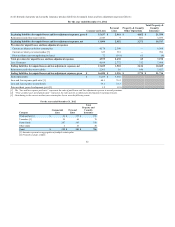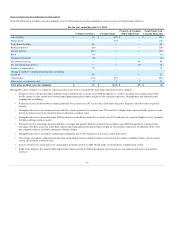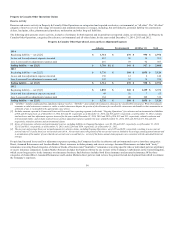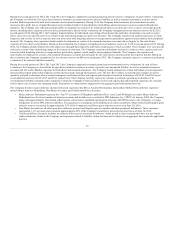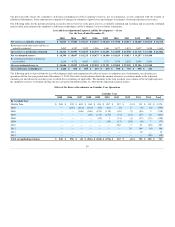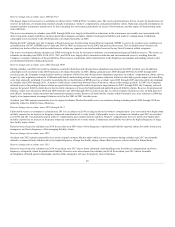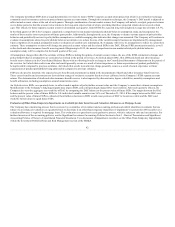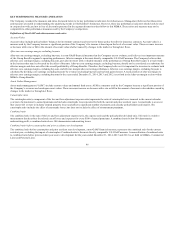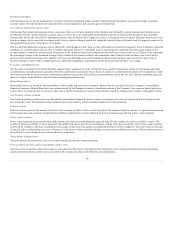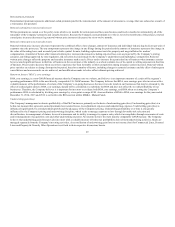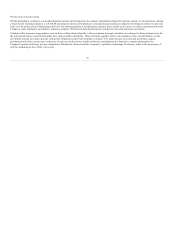The Hartford 2014 Annual Report Download - page 60
Download and view the complete annual report
Please find page 60 of the 2014 The Hartford annual report below. You can navigate through the pages in the report by either clicking on the pages listed below, or by using the keyword search tool below to find specific information within the annual report.
Reserve changes for accident years 2004 & Prior
The largest impacts of net reserve re-estimates are shown in the “2004 & Prior” accident years. The reserve deterioration is driven, in part, by deterioration of
reserves for asbestos, environmental, assumed casualty reinsurance, workers’ compensation, and general liability claims. Numerous actuarial assumptions on
assumed casualty reinsurance turned out to be low, including loss cost trends, particularly on excess of loss business, and the impact of deteriorating terms
and conditions.
The reserve re-estimates in calendar years 2005 through 2006 were largely attributable to reductions in the reinsurance recoverable asset associated with
older, long-term casualty liabilities, and unexpected development on mature claims in both general liability and workers’ compensation. In addition,
catastrophe reserves related to the 2004 hurricanes developed favorably in 2006.
During the 2007 calendar year, the Company refined its processes for allocating incurred but not reported (“IBNR”) reserves by accident year, resulting in a
reclassification of $347 of IBNR reserves from the 2003 to 2006 accident years to the 2002 and prior accident years. This reclassification of reserves by
accident year had no effect on total recorded reserves within any segment or on total recorded reserves for any line of business within a segment.
The reserve re-estimates during calendar year 2008 were largely driven by increases in asbestos, environmental and general liability reserves. The reserve re-
estimates in calendar years 2009, 2010, 2011, 2013 and 2014 were largely due to increases in asbestos and environmental reserves, resulting from the
Company’s annual evaluations of these liabilities. These reserve evaluations reflect deterioration in the litigation environment surrounding asbestos and
environmental liabilities during this period.
Reserve changes for accident years 2005 through 2009
During calendar year 2006, favorable re-estimates occurred in both loss and allocated loss adjustment expenses for the 2005 accident year. In addition,
catastrophe reserves related to the 2005 hurricanes developed favorably in 2006. During calendar years 2006 through 2008 for the 2005 through 2007
accident years, the Company recognized favorable re-estimates of both loss and allocated loss adjustment expenses on workers’ compensation claims, driven,
in part, by state regulatory reforms in California and Florida, underwriting actions, and expense reduction initiatives that had a greater impact in controlling
costs than originally estimated. Even after considering the reclassification of IBNR reserves, accident years 2005 through 2007 show favorable development
in calendar years 2006 through 2011. A portion of the release comes from short-tail lines of business, where results emerge quickly. In 2007, the Company
released reserves for package business claims as reported losses emerged favorably to previous expectations. In 2007 through 2009, the Company released
reserves for general liability claims due to the favorable emergence of losses for high hazard and umbrella general liability claims. Reserves for professional
liability claims were released in 2008 and 2009 related to the 2005 through 2007 accident years due to a lower estimate of claim severity on both directors’
and officers’ insurance claims and errors and omissions insurance claims. Reserves of auto liability claims, within Personal Lines, were released in 2008 due
largely to an improvement in emerged claim severity for the 2005 to 2007 accident years.
Accident year 2009 remains reasonably close to original estimates. Modest favorable reserve re-estimates during calendar periods 2009 through 2014 are
primarily related to liability lines of business.
Reserve changes for accident years 2010 through 2011
Unfavorable reserve re-estimates in calendar year 2011 on accident year 2010 are largely driven by workers' compensation. Loss cost trends were higher than
initially expected as an increase in frequency outpaced a moderation of severity trends. Unfavorable reserve re-estimates in calendar year 2013 on accident
year 2010 and 2011 are primarily related workers’ compensation and commercial auto liability. Workers’ compensation loss cost trends were higher than
initially expected as an increase in frequency outpaced a moderation of severity trends. Commercial auto liability was driven by higher frequency of large
loss bodily injury claims.
Reserves were released in calendar year 2014 for accident year 2010 due to lower frequency of professional liability reported claims, favorable bond claim
emergence, and lower frequency of late emerging liability claims.
Reserve changes for accident year 2012
Accident year 2012 remains reasonably close to the original estimate. Modest unfavorable reserve re-estimates during calendar year 2013 are primarily
related to commercial auto liability driven by higher frequency of large loss bodily injury claims offset by reserve releases related to Storm Sandy.
Reserve changes for accident year 2013
Reserves were released in calendar year 2014 on accident year 2013 due to lower estimated claim handling costs for workers' compensation and lower
frequency of reported claims for professional liability. Reserves were also released in calendar year 2014 for accident year 2013 due to favorable
development of fourth quarter catastrophes and favorable emergence of losses for property lines of business.
60


